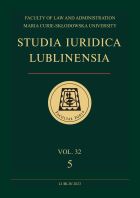Intergovernmental Coordination in Portugal
Intergovernmental Coordination in Portugal
Author(s): Teresa Ruel, Noémia Bessa Vilela, Natacha Jesus Silva, Žan-Jan OplotnikSubject(s): Governance, Public Administration, Public Law
Published by: Wydawnictwo Naukowe Uniwersytetu Marii Curie-Sklodowskiej
Keywords: intergovernmental coordination; political actors; fiscal autonomy; Portugal;
Summary/Abstract: Relations between political units – levels of government – in a multilevel structure can be organized according to a range of institutions and processes. Intergovernmental relations suggest that the different levels of government interact with their political actors, namely executives, parliaments, or political parties. The research studies on this topic have concentrated attention on federal systems, and unitarian systems have been neglected. Next to that it must be stressed, that to exercise the competences of the decentralised levels there must be some sort of fiscal autonomy. Without fiscal autonomy, there can be no autonomy for subnational level of governments. Portugal illuminates this landscape. The intergovernmental relation or coordination between the Portugal mainland and the regional governments (Azores and Madeira) are mainly informal, so far. In this paper, we intend to explore and understand the role of political actors in such intergovernmental coordination and the institutional mechanisms they promote to that coordination.
Journal: Studia Iuridica Lublinensia
- Issue Year: 32/2023
- Issue No: 5
- Page Range: 31-42
- Page Count: 12
- Language: English

